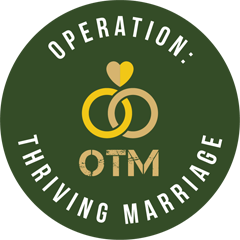New Holiday Traditions
As I sit here thinking about Christmas and marriage I look out the window of this little local coffee house and see a string of lights wrapped around a bare tree across the street. The light pole on this side of the street is wrapped in lights, garland, and red ribbon. Inside, I’m surrounded by red ribbons and candy canes.

One of the great things about this season is the tradition. Traditions help ground us. They connect us to who we are and strengthen our relationships. Family identities are reinforced through the traditions they share. Our traditions are a magnet drawing us back to our families, communities, and heritage. That’s why Christmas traditions are important.
It’s also why new Christmas traditions can create strife in families. When your spouse wants to celebrate different Christmas traditions, it can have a disorienting effect. It can feel like you’re abandoning the safety and comfort of your past. It can feel like you’re being ripped away from your family, heritage, and history.
I know for some, new traditions are an escape from the pain of an unhealthy childhood. For many, however, Christmas traditions are precious.
It’s not only you and your spouse that wrestle with changes to Christmas traditions. Parents do too. Parents can experience difficult emotions watching their children form their own families and traditions. There is a sense of loss when their little boy or girl isn’t there to celebrate Christmas the same way anymore. There’s a feeling of relational distance when their children prioritize their spouse over their parents. There’s a feeling of rejection when valued traditions are not honored the same.
It is important and valuable for couples to develop their own Christmas traditions. Wisdom is required by both parents and spouses navigating these changes, so that relationships are strengthened rather than damaged.
Navigating Your Spouse’s Traditions
Unexpectations, unmet expectations that are unstated, unshared, or unreasonable, are the cause of every conflict in marriage. Conflicts over Christmas traditions usually fall into the unshared category.
Unshared expectations are expectations that are deeply ingrained in us to the point that it is strange our spouse doesn’t feel the same way. They seem so obvious they don’t need to be stated. To us, these are things that everyone does.
A Christmas unexpectation for us was Santa Claus. For me, Santa Claus was a fun game that society plays with children creating wonder and excitement. Doesn’t everyone tell their children about Santa Claus? Jen felt very differently about it. Jen saw Santa as a bald-faced lie society perpetuates on children. She didn’t want to lie to our children because she didn’t want them to think we lied about other, more important things like Jesus. I was shocked and confused. I certainly didn’t want our children to think we lied to them about important things. But isn’t perpetuating the story of Santa harmless fun?
It was hard to compromise on this one. One of us couldn’t say, “Santa Claus is coming to town,” while the other said he is a myth. We settled on the decision to “neither confirm nor deny the existence of the individual commonly referred to as Santa Claus.” We let our children come to conclusions about Santa as they encountered the story in culture. At about five or six, our children came to us asking about Santa. Both came to the conclusion that Santa wasn’t real. We affirmed their conclusion but told them not to ruin the game for the other children.
We had to take a tradition and look at it through the lens of our values. The story of Santa is unavoidable. It is a fun game almost everyone plays. We value our children participating in the community of their peers. We also value honesty. We made our decision based on these values.
As you navigate Christmas traditions with your spouse, we encourage you to start with your values. What values do you want in your marriage? What traditions support those values? What actions around Christmas traditions support those values? Make decisions together that will lead toward living out those values.
Navigating Christmas Traditions with Parents
As I said above, parents deal with a lot of emotions as their children develop new Christmas traditions. It’s easy to think that they should understand. Didn’t they go through this with their parents? Well, maybe. It’s possible they were able to continue the traditions of their parents without much change. It doesn’t really matter. Whatever the reason, they have feelings about the situation and you will have to navigate it with them.
I should point out that “honoring your father and mother” is relevant here. Loving our neighbor as ourself includes loving our parents. One of the ways we do this is by honoring them as our parents. Honor in this case does not mean submit. It does, however, mean respecting them as parents, respecting their values, their feelings, and their wisdom.
This means communicating with love and respect. As you have conversations about changes in Christmas traditions, listen to both sets of parents. Work to understand how they feel and why they feel that way. Be prepared to change your approach as you glean wisdom from their experience. As a couple, evaluate how you can respect your parents’ values as you make decisions based on yours.
The Santa situation was interesting for us here. I have a nephew that is two years older than our oldest. My sister and her husband were continuing the story of Santa in their family and my parents were joyful participants. They didn’t understand our decision. On Christmas Eve, we went to my parents house to open gifts and my niece and nephew watched the NORAD Santa map while we were there. We let our children watch the map with their cousins, but we asked that my parents not make a big deal about what Santa was bringing for Christmas. When our children came to the conclusion that Santa was not real, we asked them not to ruin the game for their cousins. This seemed to work well for us.
The important point here is you have to make decisions as a couple in keeping with the values you have for your family. As Christians, however, “honoring your father and mother” is a value you should hold. It doesn’t mean you submit to parents but it does mean you navigate the issue with respect and very open communication.
When Your Children Start New Traditions
It’s not only adult children’s responsibility to navigate Christmas tradition changes in a loving way. Parents must navigate them too. Remember part of marriage is “leaving father and mother.” It’s not just physically leaving. There is an emotional and social leaving that happens too. I know it’s tough. That’s your little boy or girl. Feelings of abandonment and rejection are normal.
Remember, however, they’re not truly abandoning or rejecting you. They are doing exactly what you raised them to do. They are becoming adults who will experience and express God’s love in new ways. They are taking the foundation that you laid for them and living out God’s kingdom values in new ways. This includes how they celebrate his birth.
You have the opportunity to demonstrate God’s love in a new way. How are you going to support your children? How are you going to guide them with the wisdom?
It doesn’t mean you compromise your values. It means you help them see your and lovingly navigate these changes with them. Be honest about what you feel and why. Have open, honest, loving, respectful conversations. You will strengthen the relationship you have with your child and your son or daughter-in-law, setting a long term foundation for healthy relationships.
Conclusion
Christmas traditions are beautifully tied to very strong emotions and memories. As couples form new families, a natural outgrowth is new or adapted traditions. Changes bring out strong emotions, especially when tied deeply to individual and family identity. It is normal and healthy to feel uncomfortable emotions during the transitions. The question is, are you going to let those feelings create barriers to important relationships or cement your values, and grow your relationships in healthy ways demonstrating God’s love to each other and the people around you?
